Stocks are primarily bought and sold on stock exchanges, such as the New York Stock Exchange (or NYSE), but can be traded privately as well. Although the bond market is larger than the stock market, the stock market receives more press. Historically, stocks have had a higher return than other types of investments over time. The trade of stock is regulated by the Securities Exchange Commission, or SEC, in order to protect investors by maintaining a fair and orderly functioning of the securities markets. Stocks, also known as equity, are a security representing a holder's proportionate ownership of a corporation. Stockholders are therefore entitled to that portion of the corporation's assets and earnings. Companies issue stock in order to raise capital to finance future growth. Have questions about Stocks? Click here. When you buy a stock, you are purchasing a piece of the company, making you a shareholder. The size of your ownership stake then depends on the number of shares you own relative to the total number of shares outstanding. Being a shareholder also often gives you the right to vote on company decisions. Though they are often used interchangeably, it's vital to distinguish between a "stock" and a "share." While "stock" refers to the ownership certificate of any company, a "share" signifies ownership in a particular company. For instance, if someone says they own stocks, it signifies ownership in one or more companies. But if they mention they own 100 shares of XYZ company, it provides a more specific ownership definition. There are two types of stocks: common and preferred stock. 1.) Common Stock comes with the ability to cast votes at shareholder meetings and the right to receive dividends. If the company goes bankrupt, common stock investors are last in line to receive any remaining funds. However, they get to partake in the growth and success of the company through rising stock prices and dividends. 2.) Preferred Stock doesn't come with the right to vote, but does come with the right to receive dividends prior to common stockholders and higher priority in getting paid back if the company goes bankrupt and is liquidated. Additional types of stock include: Growth stocks belong to companies that are expected to grow their profits at an above-average rate compared to other firms in the market. They typically do not pay dividends, as the companies usually reinvest their earnings to fuel further growth. The primary allure of growth stocks is the potential for stock price appreciation. Value stocks are shares of companies that are considered undervalued compared to their intrinsic worth. They often trade at a lower price-to-earnings ratio than the market average and may pay dividends. Investors seek value stocks hoping that the market has overlooked their true potential. Blue-chip stocks come from well-established and financially stable companies with a history of providing reliable performance. They are often industry leaders and have a track record of paying dividends. Investing in blue-chip stocks is often viewed as less risky than growth stocks or other types of investments. The terms "small-cap", "mid-cap", and "large-cap" refer to a company's market capitalization, which is calculated by multiplying its stock price by the number of shares outstanding. Small-cap companies typically have a market capitalization under $2 billion, mid-cap companies range between $2 and $10 billion, and large-cap companies have a market capitalization over $10 billion. Each category comes with its own set of risks and potential rewards. Generally, small-cap stocks might offer more growth potential, while large-cap stocks offer more stability. The S&P 500, or the Standard & Poor's 500, is an index comprising 500 of the largest companies listed on the New York Stock Exchange (NYSE) or Nasdaq. It's a market-capitalization-weighted index, meaning companies with larger market caps have a more significant influence on the index's movement. As one of the most followed equity indices globally, the S&P 500 is often viewed as a barometer for the U.S. stock market and the U.S. economy's health. The Dow Jones Industrial Average, often referred to as "the Dow," is one of the oldest and most-watched stock indices in the world. Comprising 30 significant U.S. companies, the DJIA is a price-weighted index, which means companies with a higher stock price have a more significant influence on the index's value. The Dow serves as a snapshot of the broader market and economy. The Nasdaq Composite Index includes over 2,500 companies listed on the Nasdaq stock exchange. Unlike the DJIA, the Nasdaq is market-capitalization-weighted. It is known for its large portion of technology stocks, making it a good gauge for the tech industry's performance. While it provides a comprehensive overview of the market, its tech-heavy nature can make it more volatile than other indices. Choosing a stock brokerage is the first step in your journey to buying stocks. Brokerages are firms that are licensed to buy and sell stocks on stock exchanges. When selecting a brokerage, consider factors such as trading fees, account minimums, research tools available, and the platform's ease of use. Some brokerages also offer educational resources for novice investors. Once you've chosen a brokerage, the next step is to open a trading account. This process usually requires providing some personal information, undergoing a financial review, and setting up a way to fund the account. Most brokerages nowadays offer online account setup, making the process seamless and quick. After setting up your trading account, you're ready to buy stocks. This involves placing stock orders through your brokerage platform. There are different types of orders you can place, like market orders, limit orders, stop-loss orders, among others. It's crucial to understand the differences and when to use each type. Brokerage firms act as intermediaries between buyers and sellers in the stock market. They facilitate the buying and selling process, ensuring smooth transactions. For their services, they charge commissions or fees. Brokerages can vary from full-service firms offering investment advice and portfolio management to discount brokerages where investors make their own trading decisions. With the rise of technology, online trading platforms have become increasingly popular. These platforms allow individuals to trade directly, without the need for a traditional broker. They provide tools, charts, and other resources to help investors make informed decisions. Moreover, online platforms often come with lower fees compared to traditional brokerages. Market orders and limit orders are two common order types used by investors. A market order is a request to buy or sell a stock immediately at the best available current price. On the other hand, a limit order sets the maximum or minimum price at which you are willing to buy or sell. Understanding the distinction and when to use each can help in executing trades efficiently. Stock exchanges are venues where stock buyers and sellers meet to conduct trades. Some of the world's most famous stock exchanges include the New York Stock Exchange (NYSE), Nasdaq, and the Tokyo Stock Exchange (TSE). Exchanges ensure transparency, providing real-time trading information and ensuring that the best price is obtained for each trade. The Discounted Cash Flow method is a valuation technique that determines a company's current value based on its estimated future cash flows. By projecting these cash flows and then "discounting" them to present value based on a desired rate of return, investors can estimate what a company is worth today. The PEG ratio is a valuation metric that considers both a company's price-to-earnings (P/E) ratio and its expected earnings growth rate. A lower PEG might indicate that a stock is undervalued, given its earnings performance and growth outlook. However, like all metrics, it's essential to compare PEG ratios within industries. The Dividend Discount Model values a stock by estimating the present value of its expected future dividends. It's particularly useful for companies that consistently pay dividends. The DDM calculates the present value of these future payouts to provide an estimate of a stock's intrinsic value. Earnings reports, released quarterly by publicly-traded companies, provide insight into a company's financial health. These reports can significantly influence stock prices as they reveal revenues, profits, and other vital financial metrics. If a company reports earnings that exceed analyst expectations, its stock price might rise, and vice versa. Economic indicators, like unemployment rates, inflation rates, and gross domestic product (GDP) growth, can influence stock prices. These indicators provide a snapshot of a country's economic health. For instance, a rising GDP might boost stock prices as it indicates a thriving economy. Market sentiment refers to the overall attitude of investors toward a particular stock or the stock market in general. Factors like news headlines, geopolitical events, and major financial decisions can shift sentiment, leading to stock price fluctuations. Positive sentiment can drive prices up, while negative sentiment can push them down. Stock prices can also be affected by trends within an industry. For instance, if electric vehicles (EVs) become popular, stocks of EV manufacturers might rise. Conversely, if there's negative news about the safety of these vehicles, the same stocks might drop. One of the primary advantages of stocks is the potential for high returns. Historically, the stock market has provided higher average returns than other investment avenues, like bonds or savings accounts. While past performance doesn't guarantee future results, stocks offer the potential for significant capital appreciation over the long term. Stocks are considered liquid assets because they can be easily converted into cash. Stock exchanges facilitate the buying and selling of stocks, ensuring that investors can quickly enter or exit their positions when needed. By purchasing stocks, investors gain partial ownership in companies. This ownership comes with certain rights, such as voting on company decisions and sharing in the profits through dividends. Ownership also means benefiting from the company's growth and success. The stock market can be unpredictable, with prices rising and falling based on a plethora of factors. This volatility means that there's a potential for both significant gains and significant losses in a short period. Systematic risks are market-wide risks that can't be avoided, like inflation or economic recessions. Unsystematic risks are company-specific risks, such as a company going bankrupt. Diversifying a portfolio by holding various stocks can mitigate unsystematic risks but not systematic ones. While the stock market has historically trended upwards, there have been periods of prolonged downturns, known as bear markets. During these times, stock prices drop, and investors can experience substantial losses. Stocks represent ownership in a company and offer investors the potential for high returns, liquidity, and a stake in corporate growth. The trade of stocks is regulated by the Securities Exchange Commission (SEC) to ensure market integrity. To buy stocks, one must choose a brokerage, open a trading account, and place stock orders based on market or limit preferences. Stock market indices like the S&P 500, Dow Jones Industrial Average, and Nasdaq Composite gauge market health. Valuation methods, including DCF, PEG ratio, and DDM, aid investors in determining stock worth. Factors influencing stock prices encompass earnings reports, economic indicators, market sentiment, and industry trends. Despite advantages, stocks also entail risks, including market volatility, systematic and unsystematic risks, and market downturns. What Is a Stock?
Stock Meaning
Types of Stock
Growth Stocks
Value Stocks
Blue-Chip Stocks
Small-Cap, Mid-Cap, and Large-Cap Stocks
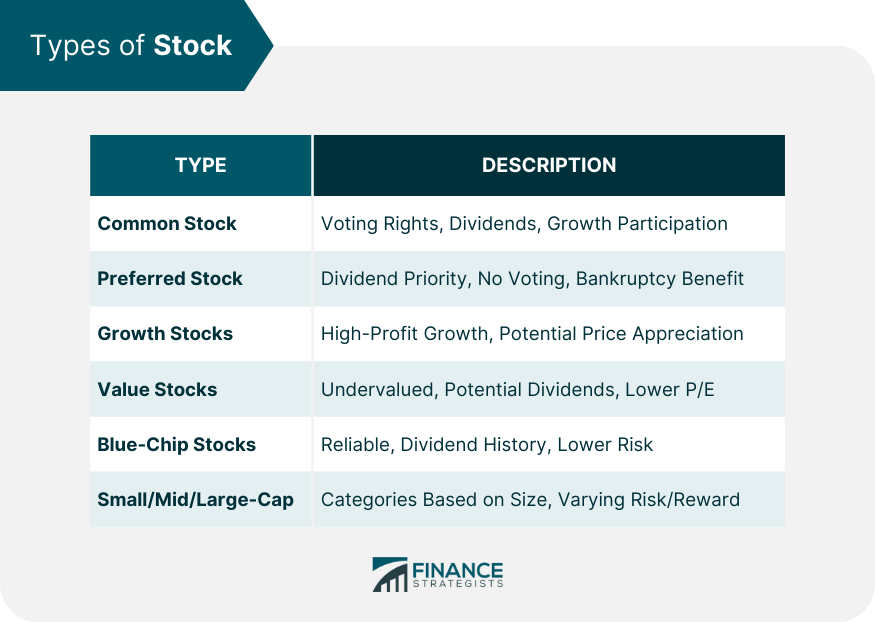
Stock Market Indices
S&P 500
Dow Jones Industrial Average (DJIA)
Nasdaq Composite

How to Buy Stocks
Select a Stock Brokerage
Open a Trading Account
Place Stock Orders

How Stocks Are Traded
Brokerage Firms
Online Trading Platforms
Market Orders vs Limit Orders
Stock Exchanges
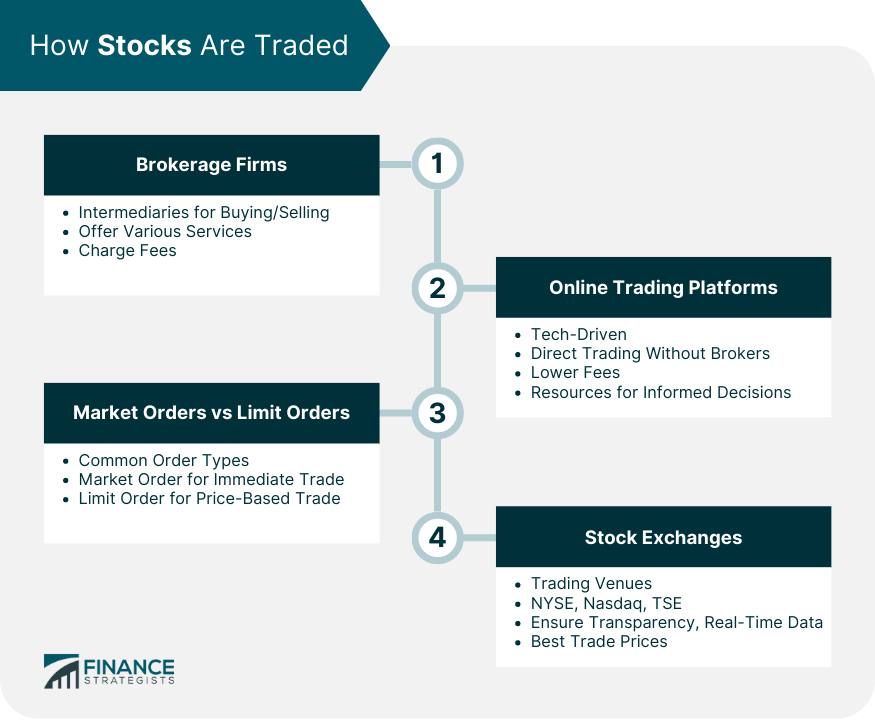
Stock Valuation Methods
Discounted Cash Flow (DCF)
Price/Earnings to Growth (PEG) Ratio
Dividend Discount Model (DDM)
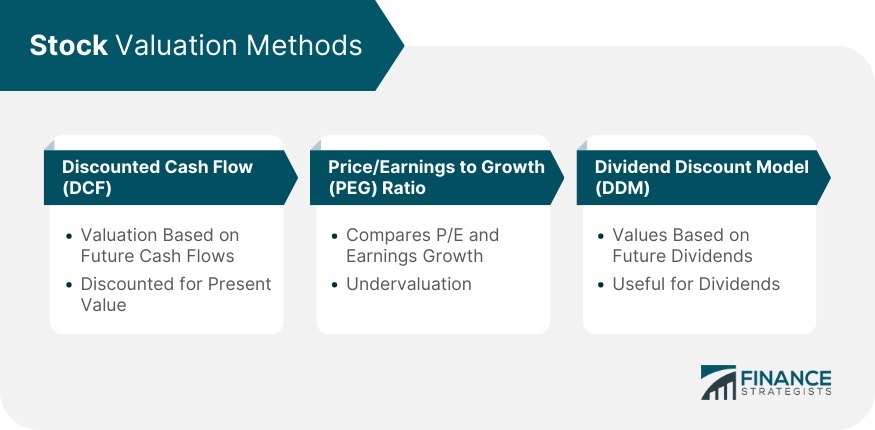
Factors Affecting Stock Prices
Earnings Reports
Economic Indicators
Market Sentiment
Industry Trends
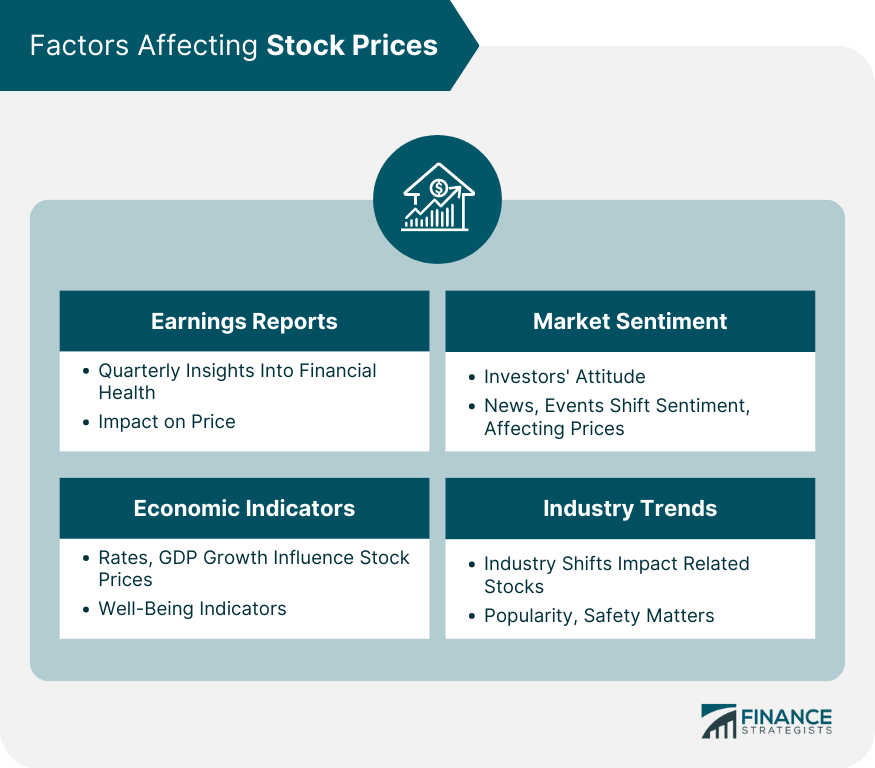
Advantages of Stocks
Potential for High Returns
Liquidity
Ownership in Companies
Risks Associated With Stocks
Market Volatility
Systematic and Unsystematic Risks
Market Downturns
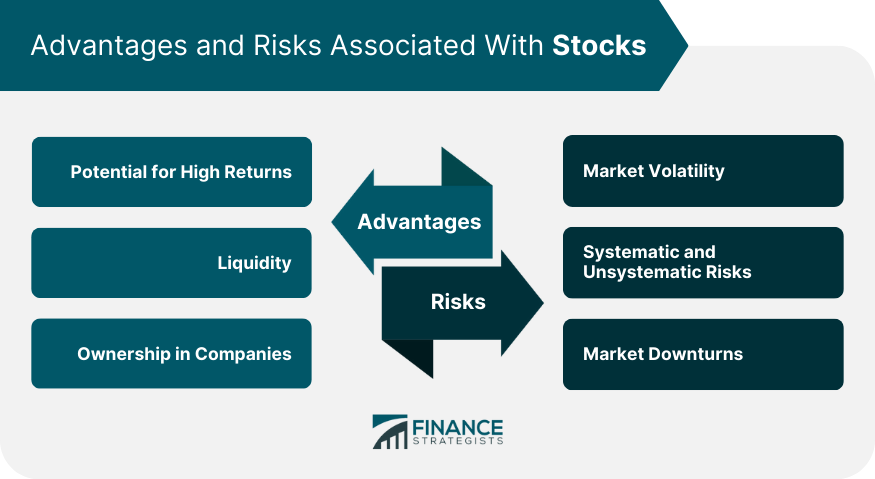
Conclusion
Stocks FAQs
Stocks, also known as equity, are a security representing a holder’s proportionate ownership of a corporation. Stockholders are therefore entitled to that portion of the corporation’s assets and earnings. Companies issue stock in order to raise capital to finance future growth.
There are two types of Stock: common and preferred stock.
Stocks are primarily bought and sold on stock exchanges, such as the New York Stock Exchange (or NYSE), but can be traded privately as well.
Historically, stocks have had a higher return than other types of investments over time.
The trade of stock is regulated by the Securities Exchange Commission, or SEC, in order to protect investors by maintaining a fair and orderly functioning of the securities markets.
True Tamplin is a published author, public speaker, CEO of UpDigital, and founder of Finance Strategists.
True is a Certified Educator in Personal Finance (CEPF®), author of The Handy Financial Ratios Guide, a member of the Society for Advancing Business Editing and Writing, contributes to his financial education site, Finance Strategists, and has spoken to various financial communities such as the CFA Institute, as well as university students like his Alma mater, Biola University, where he received a bachelor of science in business and data analytics.
To learn more about True, visit his personal website or view his author profiles on Amazon, Nasdaq and Forbes.















